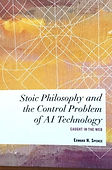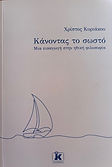ZENO STOIC CENTRE

Publications on Stoic Philosophy by Members of the Centre

Edward H Spence
To what degree is technology – in the form of products and processes – capable of contributing to human enhancement and wellbeing? I cases in which the impact of technology on society is harmful, what is technology good for?
To answer these questions, Edward H Spence develops and applies a normative model based on rationalists and virtue ethics as well as Stoic and neo-Stoic philosophy.

Edward H Spence
This book offers an innovative approach to evaluating information and knowledge and its relation to the good life, in the age of Autonomous Intelligent Machines, through the concept of wisdom. The author draws from the Stoics to present a neo-Stoic account of wisdom, which he then applies to the technologies in question.

Susi Ferrarello and Christos Hadjioannou
This book brings together two schools of thought and practice that – despite rarely being examined jointly – provide an incredibly fruitful way for exploring thinking, the mind, and the nature and practice of mindfulness. A rich array of topics and themes are explored, ranging from Stoicism and the origins of mindfulness in Buddhism and eastern thought to meditation, self-awareness, the body and embodiment, and critiques of mindfulness.

Christos Kyriakou
Doing the Right Thing. An Introduction to Moral Philosophy.
In Greek

Nakis Theocharides
A personal development book focused on fitness for maximum and effective results. The philosophy of Fitnoûss decodes fundamental principles of success applied to fitness, utilizing the triptych of Knowledge-Application-Result through education and motivation

Seamus Miller and Terry Bossomaier
In Cybersecurity, Ethics and Collective Responsibility (Oxford University Press, 2024) normative institutional theory is integrated with applied ethics and technical understanding of cybertechnology to provide a significant new interpretation of ethics and cybersecurity and suggests ethical guidelines to inform public policy in cybersecurity and cyberspace regulation.

Sotos Shiakides
This book explores how and to what extent rationality can provide guidance for human action - individual and collective, private and public - particularly under the conditions of modernity. The theme is approached through the examination of Habermas’s many important contributions on the subject.

Edward H Spence
Ethics Within Reason, explores and demonstrates Alan Gewirth's notion of self-fulfilment as a form of neo-Stoic philosophy. and concludes as in Stoic Philosophy, virtue is necessary and sufficient for both neo-Stoic eudaimonia and Stoic eudaimonia.
Stoic Resources
These books are useful resources on your journey and exploration of Stoic Philosophy

Meditations by Marcus Aurelius - Meditations is a series of personal writings by Marcus Aurelius, Roman Emperor from 161–180 CE, recording his private notes to himself and ideas on Stoic philosophy.

Lessons in Stoicism by John Sellers is a deeply comforting and enlightening book on how Stoicism can inspire us to lead more enjoyable lives. What aspects of your life do you really control? What do you do when you cannot guarantee that things will turn out in your favour? ...

Stoic philosophy still relevant in the modern world, Pigliucci, one of the top philosophers on Twitter and a regular contributor to the New York Times, Newsweek, Washington and Huffington Posts, shows how you can apply stoicism to your everyday life and make it more meaningful. With practical tips and exercises, meditations and mindfulness, this is perfect for fans of Jules Evans' Philosophy of Life - or anyone wanting to imbue their life with new meaning.

The Daily Stoic offers 366 days of Stoic insights and exercises, featuring all-new translations from the Emperor Marcus Aurelius, the playwright Seneca, or slave-turned-philosopher Epictetus, as well as lesser-known luminaries like Zeno, Cleanthes, and Musonius Rufus. Every day of the year you'll find one of their pithy, powerful quotations, as well as historical anecdotes, provocative commentary, and a helpful glossary of Greek terms.

Epictetus taught the importance of distinguishing between what we can and what we cannot control; accepting nature's course and it's challenges; living a virtuous life among other virtuous people; choosing freedom by detaching from desires; and being a master to yourself by being a slave only to your mind.

Roman emperor Marcus Aurelius was the final famous Stoic philosopher of the ancient world. The Meditations, his personal journal, survives to this day as one of the most loved self-help and spiritual classics of all time. In How to Think Like a Roman Emperor, cognitive psychotherapist Donald Robertson weaves the life and philosophy of Marcus Aurelius together seamlessly to provide a compelling modern-day guide to the Stoic wisdom followed by countless individuals throughout the centuries as a path to achieving greater fulfillment and emotional resilience.